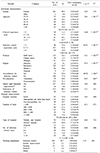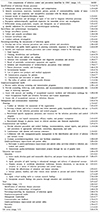1. Murphy DM, Hanchett M, Olmsted RN, Farber MR, Lee TB, Haas JP, et al. Competency in infection prevention: a conceptual approach to guide current and future practice. Am J Infect Control. 2012; 40:296–303.

2. Benner P. From novice to expert: excellence and power in clinical nursing practice. Melno Park: Addison-Wesley;1984.
3. McLagan P. Great ideas revisited Competency models Creating the future of hrd. Train Dev. 1996; 50:60–65.
4. Oh HS, Yi SE. National survey on the current status of infection control nurses and their activities in general hospitals with more than 300 beds. Korean J Nosocomial Infect Control. 2005; 10:32–42.
5. Kim KM, Jeong JS, Park HR. Infection control nurse specialist education in Korea. Am J Infect Control. 2010; 38:413–415.

6. Choi JS, Kim KM. Crisis prevention and management by infection control nurses during the Middle East respiratory coronavirus outbreak in Korea. Am J Infect Control. 2016; 44:480–481.

8. Kim KM, Choi JS. Factors affecting core competencies among infection control nurses in Korea. Korean J Adult Nurs. 2014; 26:11–21.

9. Bobay K, Gentile DL, Hagle ME. The relationship of nurses’ professional characteristics to levels of clinical nursing expertise. Appl Nurs Res. 2009; 22:48–53.

10. Chang YH, Cho YS, Kwak MJ. A study of factors related nursing competency in nurses. Clin Nurs Res. 2006; 12:7–19.
11. Murphy CL, McLaws M. Credentialing, diversity, and professional recognition-foundations for an Australian infection control career path. Am J Infect Control. 1999; 27:240–246.

12. Choi JS, Kim KM. Factors influencing the selfperceived practice levels of professional standard competency among infection control nurses in Korea. Am J Infect Control. 2014; 42:980–984.

13. Faul F, Erdfelder E, Lang AG, Buchner A. G
*Power 3: a flexible statistical power analysis program for the social, behavioral, and biomedical sciences. Behav Res Methods. 2007; 39:175–191.

14. Parker DF, DeCotiis TA. Organizational determinants of job stress. Organ Behav Hum Perform. 1983; 32:160–177.

15. Jeong JS, Yoon SW, Park ES, Kim KM, Yoo SY, Jeong I, et al. The present situation of infection control professionals, organization, and activities in Korean acute care general hospitals. Korean J Nosocomial Infect Control. 2006; 11:58–69.
16. Choi JS, Kim KM. Job embeddedness factors as a predictor of turnover intention among infection control nurses in Korea. Am J Infect Control. 2015; 43:1213–1217.

17. Her S, Kim KH, Oh HS. A study on work condition, stress, role conflict and job satisfaction of infection control nurses working in general hospitals. Korean J Adult Nurs. 2012; 24:327–338.

18. Goldrick BA. The Certification Board of Infection Control and Epidemiology white paper: the value of certification for infection control professionals. Am J Infect Control. 2007; 35:150–156.






 PDF
PDF ePub
ePub Citation
Citation Print
Print



 XML Download
XML Download